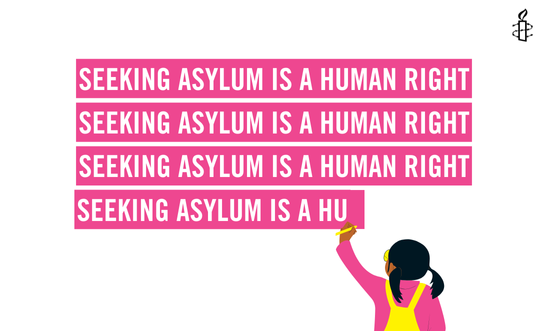
Refugee Week 2024: What does Seeking Asylum have to do with Home?

Whether we were born in the UK or have recently arrived, we all know what “home” feels like. Wanting safety for ourselves and our families is common to us all: part of our shared humanity.
Refugee Week 2024 comes in the wake of laws passed in the UK that breach long-established international obligations to guarantee everyone’s right to seek and enjoy asylum: the right to make a new home after losing it due to war or persecution.
This year’s theme of Home shows why protecting the right to seek asylum is a show of humanity: because we can all relate to wanting the safety of home for us and our families.
What does seeking asylum have to do with home?
A home is more than a place to live. It is a shelter from more than just rain and cold weather. A real home is a place where we belong, feel safe and can relax with friends, loved ones or ourselves.
The loss of home and the need to seek a new one is at the core of the refugee experience. Home – in its fuller sense – is what seeking safety is about, it’s at the heart of why people seek asylum.
Conflict and oppression across the globe is growing. In recent years, devastating new crises or escalations of old ones have erupted in Afghanistan, Ukraine, Sudan and Gaza, and many other places. Repression and conflict in other countries has continued or grown, including in Iran, Eritrea, Myanmar and Syria.
But while the need for asylum remains urgent, respect for the right to seek and enjoy it is decreasing, particularly in many of the world’s richest countries. This is ironic, because more impoverished countries like Jordan, Lebanon, Pakistan, Bangladesh, Uganda, Sudan, Ethiopia and Rwanda are the ones still carrying the larger share of responsibility to provide asylum.
This isn’t fair, and it isn’t right. If the global asylum system is to work, the responsibility for that must be shared by all - especially by those with the most wealth and capacity to do so.
At the heart of international asylum law is a guarantee to every single person, you and me, that in the very worst times, wars, genocides, political oppression, a home is still possible for us.
How is the right to seek asylum protected by international law?
By 1948 the world witnessed one of the most devastating wars and genocides in history. Many Jewish people had been refused entry to other countries to escape Nazi persecution.
From the horrors of World War 2, the Universal Declaration of Human Rights and the Refugee Convention emerge as beacons of hope.
The 1948 Universal Declaration of Human Rights is the cornerstone of international human rights law. It aims to secure the dignity and well-being of every single person, based on our common humanity. Article 14 of the Declaration states: “Everyone has the right to seek and enjoy in other countries asylum from persecution."
What is the Refugee Convention?
The Refugee Convention was created in 1951 to make this right a reality. The Convention defines who is a refugee and sets out their rights. It makes clear that it is only where a person’s own country is either incapable or unwilling to protect them from persecution that they will be entitled to asylum in another country. The Convention prohibits sending someone to a place where they may be persecuted, or penalising someone for crossing borders to seek asylum.
It’s simple: the Convention is rooted in humanity and fairness, so all countries share the responsibility for guaranteeing the right to seek and enjoy asylum. A global asylum system can only work if the responsibility is shared by all.
The theme of Refugee Week this year, home, makes two things clear: 1) the need for a safe home is part of our common humanity, and 2) a fair global asylum system, with responsibility shared fairly, is how we can ensure the dignity of home for everyone.
UK asylum policy has drifted far from meeting these needs of humanity and fairness by refusing to take responsibility for the asylum claims this country receives.
That policy must be reversed. The UK must play its part, just as it expects other countries to do.
Our blogs are written by Amnesty International staff, volunteers and other interested individuals, to encourage debate around human rights issues. They do not necessarily represent the views of Amnesty International.
0 comments